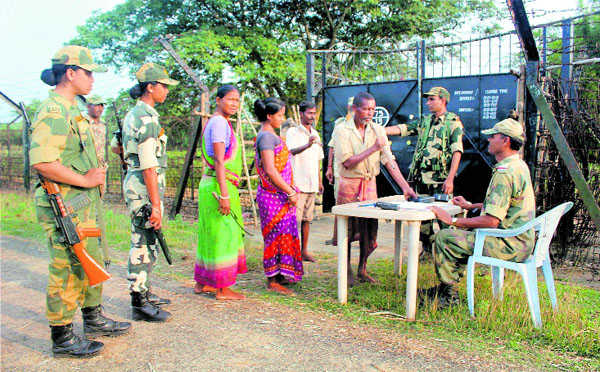
Border Security Force personnel check the identity of farmers at the border gate near Balurghat in South Dinajpur district of West Bengal. PTI
Bijay Sankar Bora in Guwahati
If you are in Assam, do a double take on your identity. Chances are you may find yourself surrounded by only questions. Why? Because even the Assamese don't know who they are! Call it semantics or a push for a cohesive society, Assam today is back where it all began for them: the 1985 Assam Accord promising to throw out tens of thousands of "illegal Bangladeshis."
Fanning this year's state poll-induced fire is the debate over indigenous people (natives) versus aliens (illegal migrants). This happened after the BJP-led NDA government tabled the Citizenship (Amendment) Bill, 2016 in Parliament amending the Citizenship Act, 1955. The objective is to facilitate citizenship to persecuted minority people -- Hindus, Sikhs, Jains, Parsis, Christians and Buddhists -- from Pakistan, Bangladesh or Afghanistan residing in India for at least six years.
The 1985 accord between the Centre and the agitation leadership basically promised detection and deportation of illegal foreign migrants from Assam and providing constitutional safeguard to 'Assamese people.' All these 31 years were marked by pussyfooting and political pedantry over 'illegal entrants.'
It was coming
There is hardly any surprise in the Modi government move: both during the 2014 general election and the Assembly poll this year, the BJP promised citizenship to these non-Muslim persecuted minorities because of 'humanitarian concern.' This, however, led to serious concerns that a 'burgeoning' population of illegal migrants -- irrespective of religion - would threaten the identity of the indigenous population. Most such fears stem from the possibility that the move might open floodgates for unspecified number of Hindus from Bangladesh to the state for gaining citizenship. Were that to happen, it would then amount to violation of the cut-off date of March 25, 1971, for detection and deportation of illegal migrants as per the provisions of the 1985 accord.
State's senior BJP leader as well as Finance, Health, Education minister Dr Himanta Bishwa Sarma has already said the persecuted Hindu minorities have only India to head for in times of crisis, whereas Muslims have several options. "If Hindus flee from countries where they fear persecution, India has to protect and shelter them. Where else can they go?" Sarma was quoted as saying.
Counter-point
Prominent organizations such as the All Assam Students' Union (AASU), Krishak Mukti Sangram Samiti (KMSS), Asom Jatiyatabadi Yuba Chatra Parishad (AJYCP), the Asam Sahitya Sabha, the apex Assamese language literary body, question if citizenship can be obtained on the basis of religion. Also, they say, the move would violate the key provisions of the Assam accord and turn the state into a dumping ground for illegal migrants from Bangladesh. Their counter-point has sparked protests, resulting in the government referring the Citizenship (Amendment) Bill 2016 to the Joint Select Committee of Parliament to take a call. This could mean more time.
The core issue, meanwhile, has become even more complex because of Clause 6 of the Assam Accord. It promises "Constitutional safeguards" for the "Assamese people". The point is who are Assamese — those who claim Assamese language as their mother tongue or those who are indigenous residents of Assam including the tribal population?
The language problem
Those who oppose citizenship to Bengali-speaking Hindus have linked it with the provision of special safeguards to "Assamese people" as per the accord. They say adding more Bengali Hindus would jack up the already sizeable Bengali-speaking population. They cite the census reports to say that there has been a gradual decline in the number of Assamese-speaking people.
Senior BJP leader Ram Madhav, Chief Minister Sarbananda Sonowal and Himanta Bishwa Sarma recently held a dialogue with a select group of opinion-makers from Assam. They explored whether at least 80 of Assam's 126 Assembly seats could be reserved for the indigenous people. That would virtually fulfill the promise of special safeguards made in the Clause 6 of the Assam accord. The meeting resolved to expand the ambit of the discussion and explore legal options, including the possibility of securing special Constitutional shield like Article 371 for Assam so that political and economic rights of indigenous communities could be protected.



























